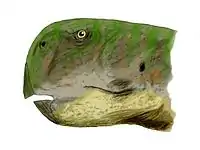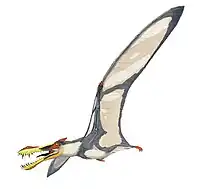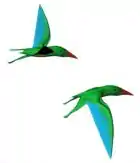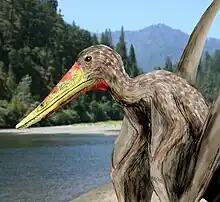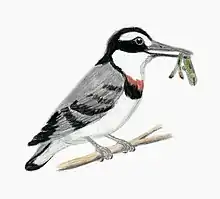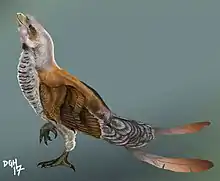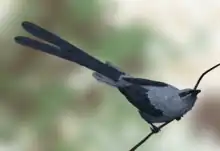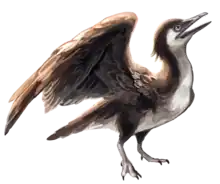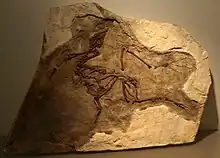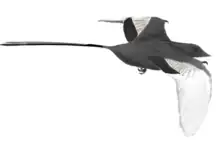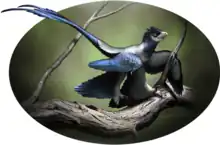| Jiufotang Formation | |
|---|---|
| Stratigraphic range: Aptian ~ | |
| Type | Geological formation |
| Unit of | Jehol Group |
| Sub-units | Shangheshou & Meileyingzi Beds |
| Underlies | Fuxin & Shahai Formations |
| Overlies | Yixian Formation |
| Lithology | |
| Primary | Mudstone |
| Other | Sandstone |
| Location | |
| Coordinates | 41°12′N 119°24′E / 41.2°N 119.4°E |
| Approximate paleocoordinates | 44°24′N 119°30′E / 44.4°N 119.5°E |
| Region | Liaoning |
| Country | |
| Type section | |
| Named for | Jiufotang, Pingfangzi, Liaoning |
| Named by | Ryuji Endo |
| Year defined | 1934[1] |
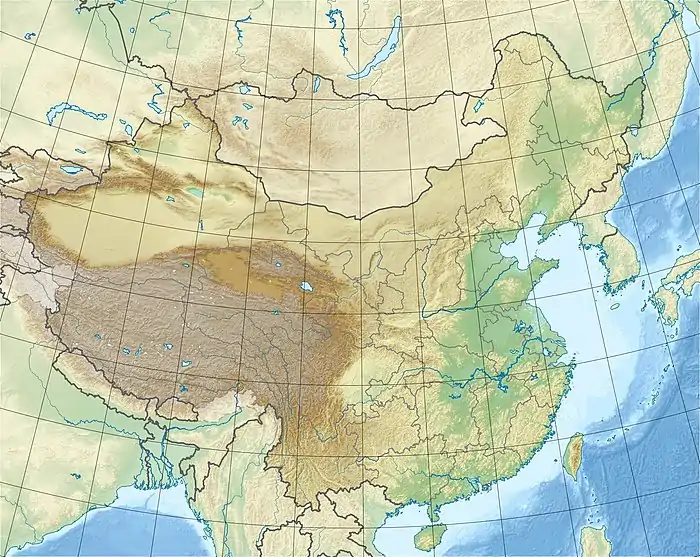 Jiufotang Formation (China) 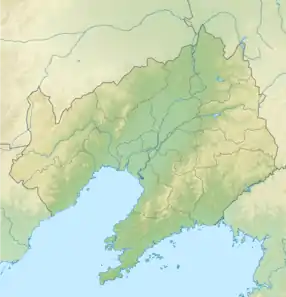 Jiufotang Formation (Liaoning) | |
The Jiufotang Formation (Chinese: 九佛堂组; pinyin: jiǔfótáng zǔ) is an Early Cretaceous geological formation in Chaoyang, Liaoning which has yielded fossils of feathered dinosaurs, primitive birds, pterosaurs, and other organisms (see Jehol Biota). It is a member of the Jehol group. The exact age of the Jiufotang has been debated for years, with estimates ranging from the Late Jurassic to the Early Cretaceous. New uranium-lead dates reveal the formation is deposited in the Aptian stage of the Early Cretaceous.[2] Fossils of Microraptor and Jeholornis are from the Jiufotang.[3]
Fossil content
Choristoderans
| Genus | Species | County | Member | Abundance | Notes |
|---|---|---|---|---|---|
| Philydrosaurus | P. proseilus | Monjurosuchid | |||
| Ikechosaurus | I. pijiagouensis | Simoedosaurid | |||
| Liaoxisaurus | L. chaoyangensis | Simoedosaurid | |||
Fish
| Genus | Species | County | Member | Notes | Images |
|---|---|---|---|---|---|
| Caeruleum[4] | C. miraculum | Weichang | A lamprey | ||
| Jinanichthys | J. longicephalus | An osteoglossomorph | |||
| Lycoptera | L. davidi | An osteoglossomorph | 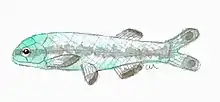 | ||
| Peipiaosteus | P. pani | A fish related to sturgeons | |||
| Protopsephurus | P. liui | A paddlefish | |||
| Sinamia | S. zdanskyi | An amiiform | 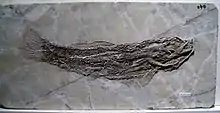 | ||
Mammaliamorphs
Several mammaliamorph specimens have been found from the Jiufotang, but only a few have been formally described and named.
| Genus | Species | County | Member | Material | Notes |
|---|---|---|---|---|---|
| Cokotherium | C. jiufotangensis[5] | Partial skeleton | A eutherian | ||
| Fossiomanus | F. sinensis[6] | A nearly complete skeleton | A tritylodontid cynodont, likely the youngest known non-mammalian synapsid | ||
| Liaoconodon | L. hui[7] | A nearly complete skeleton | A eutriconodont | ||
| Unnamed mammal | Unnamed | Partial remains including a foot and fragments of the skull | A mammal similar to Eomaia and Sinodelphys from the Yixian Formation. Found as stomach contents of Microraptor zhaoianus. | ||
Ornithischians
| Genus | Species | County | Member | Material | Notes | Images |
|---|---|---|---|---|---|---|
|
C. chaoyangensis[8] |
Liaoning | A nearly complete skeleton missing only the distal portion of the caudal series. |
A basal ankylosaurid, sister taxon to Liaoningosaurus.[8] |
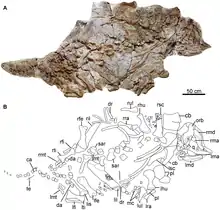 | ||
| Liaoningosaurus[9] | L. paradoxus[9] | |||||
|
Meileyingzi Bed |
"[Four] individuals, [two] complete skulls."[10] |
A ceratopsian. |
| |||
|
Shangheshou and Meileyingzi Beds |
Pterosaurs
| Genus | Species | County | Member | Material | Notes | Images |
|---|---|---|---|---|---|---|
|
C. zhangi |
A chaoyangopterid[11] |
| ||||
|
E. liaoxiensis |
A chaoyangopterid[11] | |||||
|
F. youngi |
Jianshangou Bed |
A boreopterid | ||||
| Forfexopterus | F. jeholensis | A ctenochasmatid | ||||
|
G. jingangshanensis |
Jingangshan Bed |
A ctenochasmatid | ||||
| Guidraco |
G. venator |
|||||
| Hongshanopterus | H. lacustris | An istiodactylid | ||||
| Huaxiadraco | H. corollatus | Multiple specimens | A tapejarid[13] | |||
|
"H." benxiensis |
A tapejarid; synonymized with Huaxiadraco in 2023 | |||||
| Ikrandraco |
I. avatar |
|||||
|
J. edentus |
A chaoyangopterid[11] | |||||
|
L. gui |
||||||
|
L. brachyognathus |
An istiodactylid[11] | |||||
|
L. jennyae |
||||||
| Meilifeilong | M. youhao | Jianchang | A nearly complete skeleton and a partial skull | A chaoyangopterid[14] | ||
|
N. crypticus |
A tapejaromorph; previously and still occasionally thought to be a tapejarid. Most likely a juvenile, hence small size. | |||||
|
N. ignaciobritoi |
An istiodactylid[11] | |||||
| Pangupterus | P. liui | A pterodactyloid | ||||
|
S. chaoyangensis |
A chaoyangopterid | |||||
| S. sanyainus | A chaoyangopterid[15] | |||||
|
S. dongi |
A tapejarid[11] | |||||
|
S. jii |
Previously known as Huxiapterus jii | |||||
|
V. lamadongensis |
An anurognathid | |||||
Saurischians
A large titanosaur is present in the formation.[16]
Enantiornithines
| Genus | Species | County | Member | Material | Notes | Images |
|---|---|---|---|---|---|---|
|
Alethoalaornis |
Alethoalaornis agitornis[17] |
| ||||
|
Boluochia zhengi |
"Partial skull [and] partial postcranium."[18] |
A longipterygid | ||||
| Brevirostruavis | Brevirostruavis macrohyoideus | "an extremely elongate bony hyoid element (only slightly shorter than the skull), combined with a short cranial rostrum."[19] | An enantiornithine | |||
|
Cathayornis aberransis |
An enantiornithine | |||||
|
Cathayornis caudatus |
Nomen dubium[20] | |||||
|
Cathayornis yandica |
"Partial skeleton."[18] |
An enantiornithean | ||||
|
Cuspirostrisornis houi |
A possible avisaurid | |||||
|
Dapingfangornis sentisorhinus |
An enantiornithean | |||||
|
Eocathayornis walkeri |
"Partial skeleton."[18] |
An enantiornithean | ||||
|
Gracilornis jiufotangensis |
An enantiornithean | |||||
|
Huoshanornis huji |
An enantiornithean | |||||
|
Largirostrornis sexdentoris |
An enantiornithean | |||||
|
Longchengornis sanyanensis |
An enantiornithean | |||||
|
Longipteryx chaoyangensis |
A longipterygid | |||||
| Musivavis | Musivavis amabilis | "A nearly complete and articulated skeleton preserved in a single slab."[21] | An euenantiornithean | |||
|
Rapaxavis pani |
A longipterygid | |||||
|
Shangyang |
Shangyang graciles |
An enantiornithean | ||||
|
Sinornis santensis |
"Partial skull [and] many nearly complete postcranial skeletons."[22] |
An enantiornithean | ||||
|
Xiangornis shenmi |
An enantiornithean | |||||
|
Yuanchuavis kompsosoura |
An pengornithid | |||||
Euornithines
| Genus | Species | County | Member | Material | Notes | Images |
|---|---|---|---|---|---|---|
|
A. wui |
Junior synonym of Yanornis martini[23] |
| ||||
|
C. beishanensis |
"Partial skeleton."[22] |
A basal euornithean | ||||
|
J. microdonta |
A basal euornithean | |||||
|
M. dentatus |
||||||
|
P. chaoyangensis |
||||||
|
P. lii |
||||||
|
S. lii |
A schizoourid with long, forked tail feathers | |||||
|
S. brevipectus |
An ornithuromorph | |||||
|
S. linghensis |
An ornithuromorph | |||||
|
Y. martini |
An ornithuromorph | |||||
|
Y. grabaui |
An ornithuromorph | |||||
|
Z. yangi |
A basal euornithean[25] | |||||
Non-ornithothoracean theropods
Color key
|
Notes Uncertain or tentative taxa are in small text; |
| Genus | Species | County | Member | Material | Notes | Images |
|---|---|---|---|---|---|---|
| Chongmingia[26] | C. zhengi | A partial skeleton with preserved soft tissues | A jinguofortisid avialan | |||
|
C. sanctus |
A primitive short-tailed avialan (pygostylian). Also present in the Yixian Formation | |||||
|
C. jianchangensis |
||||||
| Cratonavis[27] | C. zhui | Jianchang | A complete skeleton with preserved feathers | A jinguofortisid avialam | ||
|
D. cuhe |
Nomen dubium, named from a forged artificially assembled specimen. | |||||
|
J. prima[3] |
A jeholornithiform avialan, also present in the Yixian Formation[28] | |||||
|
J. palmapenis[29] |
A jeholornithiform avialan | |||||
|
K. longicaudatus |
"Nearly complete specimen".[30] |
A jeholornithiform avialan | ||||
|
M. gui |
Shangheshou Bed |
Extremely common[16] |
Could be synonym of Microraptor zhaoianus | |||
|
M. zhaoianus |
Shangheshou Bed[16] |
"At least [three] partial semiarticulated postcrania and several skulls."[31] Feathered integument is also preserved.[31] |
A dromaeosaurid. | |||
|
N. rectusmim |
A jeholornithiform avialan | |||||
|
O. sinousaorum |
An omnivoropterygiform avialan | |||||
|
S. angustis |
"Nearly complete skeleton without skull."[32] |
An omnivoropterygiform, a primitive short-tailed avialan | ||||
|
S. chaoyangensis |
||||||
|
Shenshiornis primita[33] |
An omnivoropterygiform avialan | |||||
|
S. yixianensis |
||||||
|
S. kazuoensis[34] |
||||||
| Wulong[35] | W. bohaiensis[35] | Chaoyang, Liaoning[35] | Complete articulated skeleton (D2933).[35] | A dromaeosaurid |
Crustaceans
| Genus | Species | County | Member | Material | Notes | Images |
|---|---|---|---|---|---|---|
| Eosestheria | Eosestheria middendorfii[36] | A clam shrimp |
Plants
| Genus | Species | County | Member | Material | Notes | Images |
|---|---|---|---|---|---|---|
| Czekanowskia | Czekanowskia rigida[37] | A member of Czekanowskiales, Dominant | ||||
| Ginkgo | Ginkgo digitata[37] | A member of Ginkgoales | ||||
| Elatocladus | Elatocladus pinnatus[37] | Conifer foliage | ||||
| Pityolepis | Pityolepis ovatus[37] | Conifer cone | ||||
| Leptostrobus | Leptostrobus sinensis[37] | A member of Czekanowksiales, occasionally misspelled "Leptosthrobus" | ||||
| Baiera | Baiera valida[37] | A member of Ginkgoales | ||||
| Baiera cf. gracilis[37] | ||||||
| Ginkgoites | Ginkgoites trancata[37] | A member of Ginkgoales, dominant | ||||
| Gingkgoites trancatus[37] | ||||||
| Podozamites | Podozamites sp.[36] | Conifer foliage | ||||
| Sphenopteris | Sphenopteris sp.[36] | Seed plant foliage | ||||
See also
References
- ↑ Endo, R. (1934). Geology and mineral resources of Manchuria 滿洲の地質及鑛産 (in Japanese). Tokyo: Sanseido.
- ↑ Yu, Zhiqiang; Wang, Min; Li, Youjuan; Deng, Chenglong; He, Huaiyu (2021-12-01). "New geochronological constraints for the Lower Cretaceous Jiufotang Formation in Jianchang Basin, NE China, and their implications for the late Jehol Biota". Palaeogeography, Palaeoclimatology, Palaeoecology. 583: 110657. Bibcode:2021PPP...583k0657Y. doi:10.1016/j.palaeo.2021.110657. ISSN 0031-0182. S2CID 239406222.
- 1 2 3 He, H.Y.; Wang, X.L.; Zhou, Z.H.; Wang, F.; Boven, A.; Shi, G.H.; Zhu, R.X. (2004). "Timing of the Jiufotang Formation (Jehol Group) in Liaoning, northeastern China, and its implications". Geophysical Research Letters. 31 (13): 1709. Bibcode:2004GeoRL..3112605H. doi:10.1029/2004GL019790.
- ↑ Huang, Weijia (2023-09-01). "A new species of fossil lamprey (Petromyzontida: Petromyzontiformes) from Hebei, China". Historical Biology: 1–13. doi:10.1080/08912963.2023.2252443. ISSN 0891-2963.
- ↑ Wang, Hai-Bing; Hoffmann, Simone; Wang, Dian-Can; Wang, Yuan-Qing (7 February 2022). "A new mammal from the Lower Cretaceous Jehol Biota and implications for eutherian evolution". Philosophical Transactions of the Royal Society B. 377 (1847). doi:10.1098/rstb.2021.0042. PMC 8819371.
- ↑ Mao, F.; Zhang, C.; Liu, C.; Meng, J. (2021). "Fossoriality and evolutionary development in two Cretaceous mammaliamorphs". Nature. 592 (7855): 577–582. Bibcode:2021Natur.592..577M. doi:10.1038/s41586-021-03433-2. PMID 33828300. S2CID 233183060.
- ↑ Meng, J.; Wang, Y.; Li, C. (2011). "Transitional mammalian middle ear from a new Cretaceous Jehol eutriconodont". Nature. 472 (7342): 181–185. Bibcode:2011Natur.472..181M. doi:10.1038/nature09921. PMID 21490668. S2CID 4428972.
- 1 2 3 Han, F.; Zheng, W.; Hu, D.; Xu, X.; Barrett, P.M. (2014). "A New Basal Ankylosaurid (Dinosauria: Ornithischia) from the Lower Cretaceous Jiufotang Formation of Liaoning Province, China". PLOS ONE. 9 (8): e104551. Bibcode:2014PLoSO...9j4551H. doi:10.1371/journal.pone.0104551. PMC 4131922. PMID 25118986.
- 1 2 周, 长付; 刘, 晴; 王, 鑫悦; 张, 洪钢 (2022). "辽西建昌早白垩世九佛堂组甲龙类化石的首次发现". 山东科技大学学报(自然科学版). 41 (3): 1–7. doi:10.16452/j.cnki.sdkjzk.2022.03.001. ISSN 1672-3767.
- ↑ "Table 22.1," in Weishampel, et al. (2004). Page 479.
- 1 2 3 4 5 6 Wang, X.; Zhou, Z. (2006). "Pterosaur assemblages of the Jehol Biota and their implication for the Early Cretaceous pterosaur radiation". Geological Journal. 41 (3–4): 405–418. doi:10.1002/gj.1046. S2CID 131602205.
- 1 2 3 4 Rodrigues, Taissa; Jiang, Shunxing; Cheng, Xin; Wang, Xiaolin; Kellner, Alexander W.A. (2015). "A new toothed pteranodontoid (Pterosauria, Pterodactyloidea) from the Jiufotang Formation (Lower Cretaceous, Aptian) of China and comments on Liaoningopterus gui Wang and Zhou, 2003". Historical Biology. 27 (6): 782–795. doi:10.1080/08912963.2015.1033417. S2CID 129062416.
- ↑ Pêgas, R. V.; Zhoi, X.; Jin, X.; Wang, K.; Ma, W. (2023). "A taxonomic revision of the Sinopterus complex (Pterosauria, Tapejaridae) from the Early Cretaceous Jehol Biota, with the new genus Huaxiadraco". PeerJ. 11. e14829. doi:10.7717/peerj.14829. PMC 9922500. PMID 36788812.
- ↑ Wang, Xiaolin; Kellner, Alexander W. A.; Jiang, Shunxing; Chen, He; Costa, Fabiana R.; Cheng, Xin; Zhang, Xinjun; Nova, Bruno C. Vila; de Almeida Campos, Diogenes; Sayão, Juliana M.; Rodrigues, Taissa; Bantim, Renan A. M.; Saraiva, Antônio A. F.; Zhou, Zhonghe (2023-12-21). "A new toothless pterosaur from the Early Cretaceous Jehol Biota with comments on the Chaoyangopteridae". Scientific Reports. 13 (1): 22642. doi:10.1038/s41598-023-48076-7. ISSN 2045-2322. PMC 10739979.
- ↑ 姬书安, 张立军; JI Shuan, ZHANG Lijun (2023-05-22). "A new species of chaoyangopterid pterosaur from the Early Cretaceous in western Liaoning, People's Republic of China". doi:10.19762/j.cnki.dizhixuebao.2023322. ISSN 1000-9515.
{{cite journal}}: Cite journal requires|journal=(help) - 1 2 3 Xu, X.; Norell, M.A. (2006). "Non-Avian dinosaur fossils from the Lower Cretaceous Jehol Group of western Liaoning, China". Geological Journal. 41 (3–4): 419–437. doi:10.1002/gj.1044. S2CID 32369205.
- ↑ Li, L., Hu, D.-Y., Duan, Y., Gong, E.-P. and Hou, L.-H. (2007). "Alethoalaornithidae fam. nov., a new family of enantiornithine bird from the Lower Cretaceous of western Liaoning." Acta Palaeontologica Sinica, 46(3): 365-372. (http://www.cqvip.com/qk/90074X/200703/25642898.html) [in Chinese]
- 1 2 3 "Table 11.1," in Weishampel, et al. (2004). Page 212.
- ↑ Li, Zhiheng; Wang, Min; Stidham, Thomas A.; Zhou, Zhonghe; Clarke, Julia (2021). "Novel evolution of a hyper-elongated tongue in a Cretaceous enantiornithine from China and the evolution of the hyolingual apparatus and feeding in birds". Journal of Anatomy. 240 (4): 627–638. doi:10.1111/joa.13588. ISSN 1469-7580. PMC 8930807. PMID 34854094. S2CID 244860443.
- ↑ O'Connor, J.; Dyke, G. (2010). "A reassessment of Sinornis santensis and Cathayornis yandica (Aves: Enantiornithes)". Records of the Australian Museum. 62: 7–20. doi:10.3853/J.0067-1975.62.2010.1540.
- ↑ Wang, Xuri; Cau, Andrea; Luo, Xiaoling; Kundrát, Martin; Wu, Wensheng; Ju, Shubin; Guo, Zhen; Liu, Yichuan; Ji, Qiang (2022-02-11). "A new bohaiornithid-like bird from the Lower Cretaceous of China fills a gap in enantiornithine disparity". Journal of Paleontology. 96 (4): 961–976. doi:10.1017/jpa.2022.12. ISSN 0022-3360. S2CID 247432530.
- 1 2 "Table 11.1," in Weishampel, et al. (2004). Page 214.
- ↑ Cau, A.; Arduini, P. (2008). "Enantiophoenix electrophyla gen. et sp. nov. (Aves, Enantiornithes) from the Upper Cretaceous (Cenomanian) of Lebanon and its phylogenetic relationships". Atti della Societa Italiana di Scienze Naturali e del Museo Civico di Storia Naturale in Milano. 149: 293–324.
- ↑ Li, Li; Jing-Qi Wang; Shi-Lin Hou (2011). "A new ornithurine bird (Hongshanornithidae) from the Jiufotang Formation of Chaoyang, Liaoning, China" (PDF). Vertebrata PalAsiatica. 49 (2): 195–200.
- ↑ O'Connor, J. K.; Zhou, Z. (2013). "A redescription of Chaoyangia beishanensis (Aves) and a comprehensive phylogeny of Mesozoic birds". Journal of Systematic Palaeontology. 11 (7): 889–906. doi:10.1080/14772019.2012.690455. S2CID 84386177.
- ↑ Min Wang; Xiaoli Wang; Yan Wang; Zhonghe Zhou (2016). "A new basal bird from China with implications for morphological diversity in early birds". Scientific Reports. 6: Article number 19700. Bibcode:2016NatSR...619700W. doi:10.1038/srep19700. PMC 4726217. PMID 26806355.
- ↑ Li, D.; Sulliven, C.; Zhou, Z.; Zhang, Z. (2010). "Basal birds from China: a brief review". Chinese Birds. 1 (2): 83–96. doi:10.5122/cbirds.2010.0002. S2CID 84976296.
- ↑ O'Connor, J.K.; Sun, C.; Xu, X.; Wang, X.; Zhou, Z. (2012). "A new species of Jeholornis with complete caudal integument". Historical Biology. 24: 29–41. doi:10.1080/08912963.2011.552720. S2CID 53359901.
- ↑ Xuri Wang; Jiandong Huang; Martin Kundrát; Andrea Cau; Xiaoyu Liu; Yang Wang; Shubin Ju (2020). "A new jeholornithiform exhibits the earliest appearance of the fused sternum and pelvis in the evolution of avialan dinosaurs". Journal of Asian Earth Sciences. 199: Article 104401. Bibcode:2020JAESc.19904401W. doi:10.1016/j.jseaes.2020.104401. S2CID 219511931.
- 1 2 "Table 10.1," in Weishampel, et al. (2004). Page 198.
- ↑ "Table 11.1," in Weishampel, et al. (2004). Page 216.
- ↑ Hu, D.; Li, L.; Hou, L.; Xu, X. (2010). "A new sapeornithid bird from China and its implication for early avian evolution". Acta Geologica Sinica (English Edition). 84 (3): 472–482. doi:10.1111/j.1755-6724.2010.00188.x. S2CID 86441777.
- 1 2 3 Ji, Q.; Ji, S.-A.; Zhang, L.-J. (2009). "First large tyrannosauroid theropod from the Early Cretaceous Jehol Biota in northeastern China". Geological Bulletin of China. 28 (10): 1369–1374.
- 1 2 3 4 Poust, Ashley W.; Gao, Chunling; Varricchio, David J.; Wu, Jianlin; Zhang, Fengjiao (2020-01-15). "A new microraptorine theropod from the Jehol Biota and growth in early dromaeosaurids". The Anatomical Record. 303 (4): 963–987. doi:10.1002/ar.24343. ISSN 1932-8486.
- 1 2 3 Shao, J. D., Tan, Q., Wang, H., Zhang, M., & He, H. Y. (2011). The Mesozoic strata and the Jurassic-Cretaceous boundary in the Daxinganling Region. Geology and Resources, 20(1), 4-11.
- 1 2 3 4 5 6 7 8 9 Pan, Y. Q., Gao, F. L., Zhang, G. R., Wang, X., & Wu, Z. J. (2015). New discovery of phytolith from Jiufotang formation in Xiaotaizi area, Liaoning Province. Geol Resources, 24, 87-92.
Further reading
- Wang, Y; Evans, SE (2011). "A gravid lizard from the Cretaceous of China and the early history of squamate viviparity". Naturwissenschaften. 98 (9): 739–743. Bibcode:2011NW.....98..739W. doi:10.1007/s00114-011-0820-1. PMID 21766177. S2CID 8017857.

